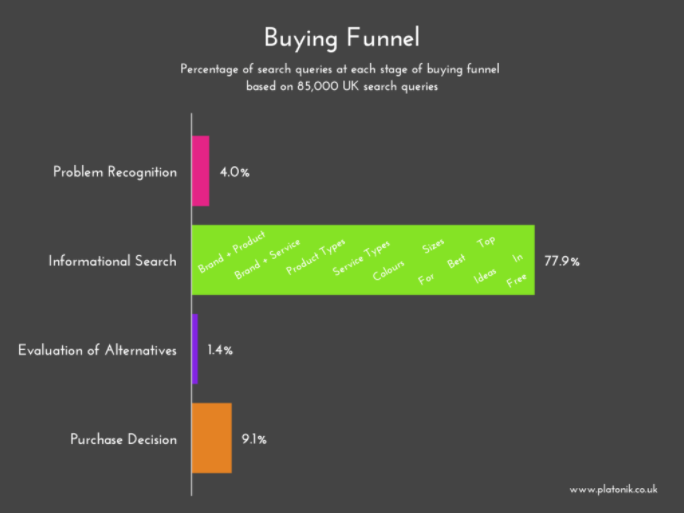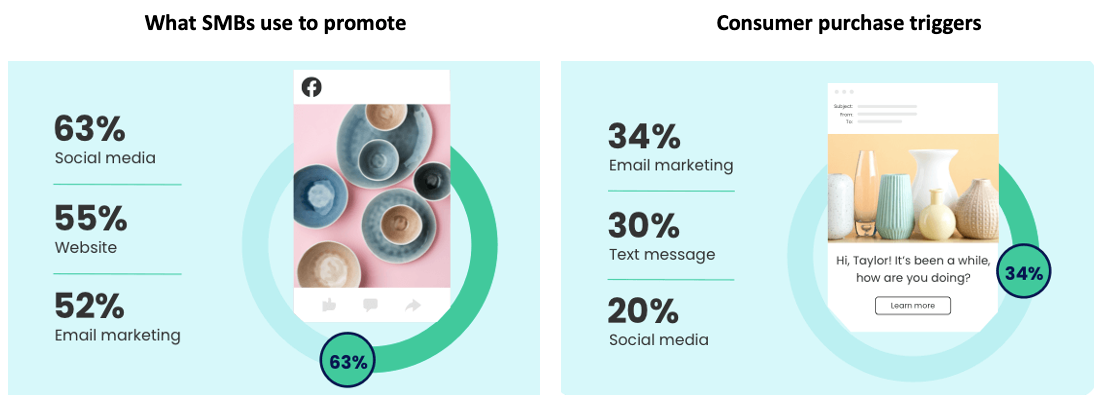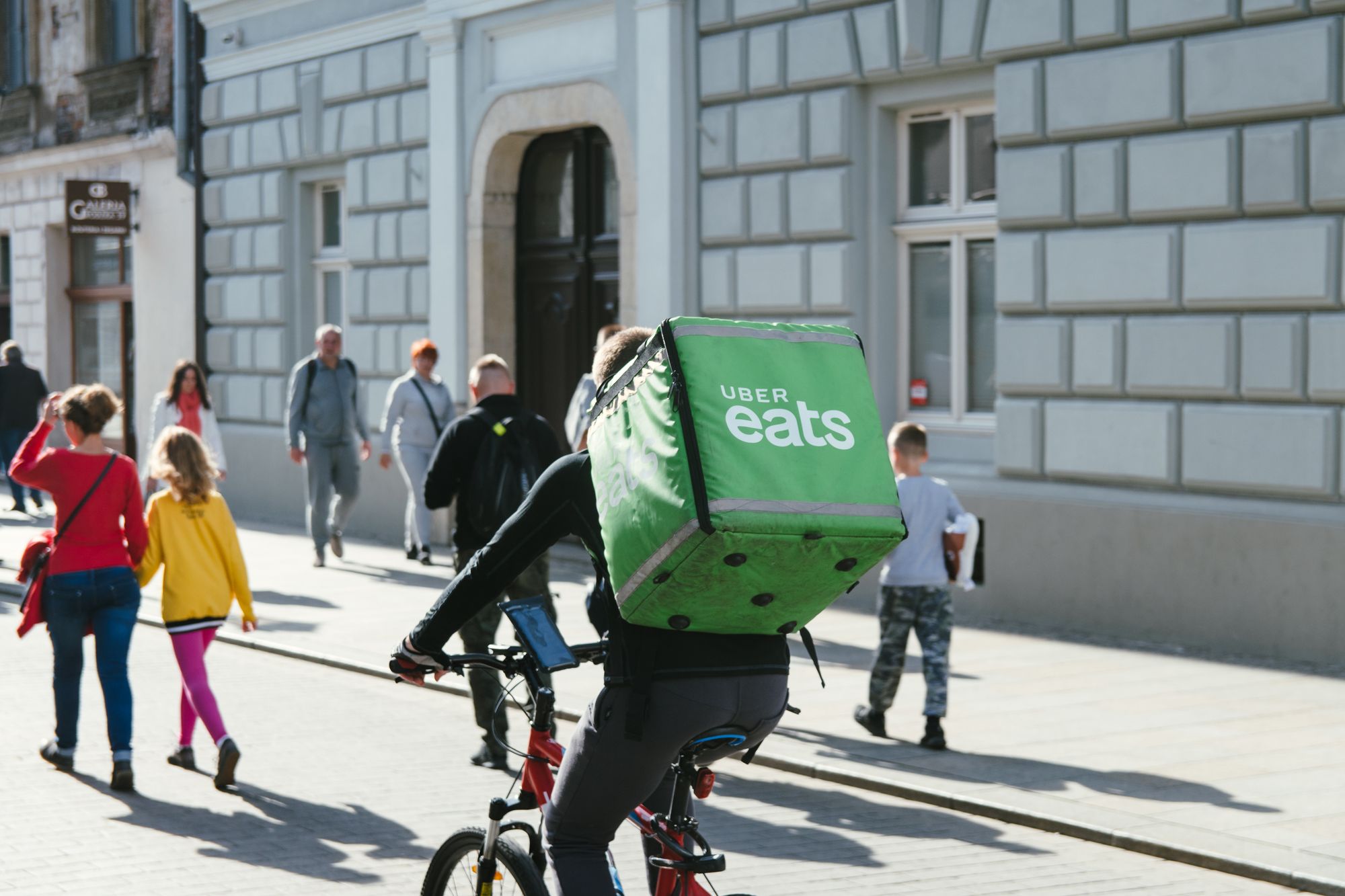Prop 22 Goes Down, SMB-Social Disconnect, Mid-Funnel Queries Dominate

Study: Most Search Queries Are 'Mid-Funnel'
Marketers discuss the "purchase funnel" all the time without really knowing what it means for their actual customer's journey. The familiar reverse pyramid makes the whole buying process conceptually neater than it is. In July 2020, Google released a terrific report, "The Messy Middle," that blows up the linear thinking behind many purchase funnel discussions. As the title implies, most of the action takes place in a messy mid-funnel process of information gathering. A new analysis of 85,000 UK search queries by Platonik largely mirrors Google's findings. The study relabels the purchase stages: 1) problem recognition, 2) informational search, 3) evaluation of alternatives, 4) purchase decision. Nearly 80% of search queries are concentrated in the informational search phase – the "messy middle." Although there's still volume, comparatively little search is happening at the true top and bottom of the funnel, says this study.

Our take:
- Platonik argues, ~92% "of search queries keywords have buying intent" but only "9% have purchase decision intent." Yet informational queries can quickly lead to purchases.
- There are plenty of SEO implications here, which I won't summarize for fear of over-simplifying (a cop out of sorts).
- Beyond the SEO takeaways, the big lesson is: don't rely on abstract models. Understand your customers' actual behavior.
The SMB Social Media Disconnect
The Call Rail survey we discussed last week found social media was the top marketing channel used by SMBs, defined to include up to 200 headcount. (Remarkably, only 15% were using local SEO/SEO.) Typically, the top three SMB channels are social, websites and email. The question then is, given its prominence, is social media delivering for SMBs? This has been an ongoing debate. New data from Constant Contact suggests social is less efficient than SMBs think. The report says, "almost half of small businesses feel social media is the most effective channel for driving business results." Yet consumers are more likely to buy something after receiving an email or text from a business. There's a 40 point discrepancy in the two surveys regarding social's efficacy. Note, however, that Constant Contact is an email marketing company.

Our take:
- Now that Facebook, Instagram and others are integrating commerce, we're likely to see much more direct buying and clearer ROI data.
- Social media can be great for awareness, as Constant Contact says, but should be combined with other channels for greater efficiency (read: email). But hello: what about SEO/search?
- SMBs may not know their customers' attitudes and behavior as well as they think they do – to their detriment.
CA Prop 22: Uber-Driven Gig Worker Law Invalidated
The Uber and Lyft-funded California 2020 Proposition 22 – to the tune of more than $200 million -- that overturned the state legislature's reclassification of drivers/gig workers as employees, was found to be unconstitutional on Friday. The ruling was based on technical issues (opinion) but the entire law was invalidated. The ruling will be appealed and eventually the California Supreme Court will decide Prop. 22's fate a year or more from now. The law has national implications because Prop. 22 is seen as a model for other states, as tech companies seek to block legislatures trying to extend employment protections to driver-contractors. During appeals Prop. 22 will likely remain in place and drivers will remain independent contractors.

Our take:
- Weeks before the 2020 election, Prop. 22 was lagging. A huge infusion of political ad spending and other tactics carried the day for Uber et al.
- Most voters thought they were doing what drivers wanted; many now regret their votes. The pro-22 campaign messaging was deceptive.
- The reclassification of drivers as employees is an existential issue for gig-worker businesses. In the UK, Uber must now treat drivers as employees, triggering an estimated $500M in additional costs.
Recent Analysis
- Podcast Episode 29: FTC takes big swing at FB, what SMBs really need, and can a local food delivery co-op make it?
- Founder Interview: How to Start a Local Restaurant Delivery Service, by Miriam Ellis.
Short Takes
- DoorDash had sought to buy Instacart for as much as $50B.
- Apple once tried to hire Google search lead Ben Gomes.
- Facebook-Istagram seeing "slow leak" of ad spend to competitors.
- Ads in print news publications outperform social media, says study.
- Lack of brand awareness a significant problem for B2B marketers.
- Inflation may cause consumer spending pull-back, could impact Q4.
- Consumers turn pessimistic on the economy.
- Macy's seeing a Delta-driven urban-suburban shopping divide.
- US majority favor mask mandates, especially in schools.
- T-Mobile sued for recent massive data breach, using CCPA.
- Two million gone: Older workers retiring early because of COVID.
- Amazon trying to rally SMBs to support its cause vs. antitrust regulators.
- Alberstons reinvents apps with digital-in store elements.
- Disney made $125M in streaming revenue from "Black Widow."
- Same Emojis now mean different things to Gen Z (WSJ).
Listen to our latest podcast.

How can we make this better? Email us with suggestions and recommendations.

